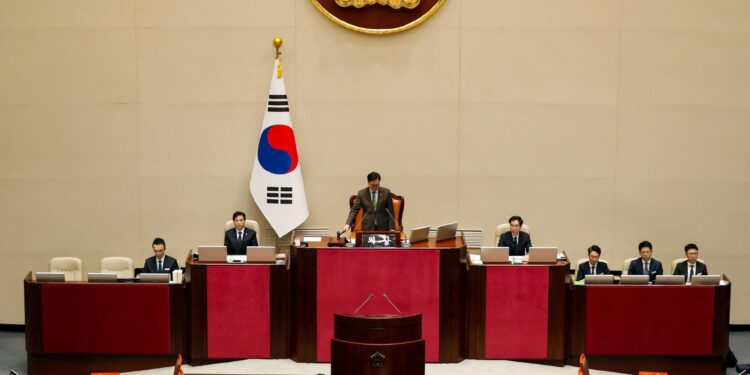South Korea is witnessing a severe political crisis that threatens economic stability and investor confidence, after the removal of President Yeon Suk-yeol and his acting successor, against the backdrop of a failed attempt to impose martial law. This led to the decline of the local currency (the won) to its lowest levels since 2009, amid an almost continuous decline since the beginning of the crisis last December.
Confidence deteriorates
According to central bank data, consumer and business confidence in Asia’s fourth-largest economy has taken its biggest hit since the start of the Covid-19 pandemic.
He attributed this to the political repercussions that began with President Yoon Suk-yeol’s attempt to impose martial law and send military forces to Parliament, before he retracted his decision a few hours later.
On December 14, Parliament voted to impeach conservative President Yoon Suk-yeol, and later impeached his acting successor, Han Dak-soo, over his refusal to complete impeachment proceedings and bring him to justice.
Thus, South Korea faced an unprecedented situation, as an acting president was removed for the first time in its history, and Finance Minister Choi Sang-mok assumed the presidency temporarily.
Constitutional challenges and a pending fate
The fate of deposed President Yoon Suk-yul depends on the decision of the Constitutional Court, which needs to ratify the decision to remove him by a two-thirds majority of its nine members.
But the opposition accuses his successor, Han Dak-soo, of obstructing the appointment of 3 judges to the court, which means that if these vacant seats are not filled, the decision will require the consensus of the remaining six judges.
In a speech after taking office, Interim President Choe Sang-mok stressed the importance of ending the political crisis, stressing that the government will do its best to achieve stability. “Despite the unexpected challenges, the South Korean economy has enough flexibility to overcome the current crisis,” he added.
The impact of the crisis on the economy
“There are already clear signs of the impact of the crisis on the economy, with consumer and business confidence declining,” Gareth Leather, of Capital Economics, wrote in a note to clients. He pointed out that the gross domestic product is expected to grow by only 2% this year, affected by the global slowdown in demand for semiconductors, one of the pillars of the South Korean economy.
Leather warned that “political polarization and the resulting uncertainty could hamper investment in the long term,” citing the case of Thailand, whose economy has been in recession since the 2014 military coup.
Optimism about the economic future
Despite the concerns, experts pointed to the resilience of the South Korean economy. “Although Yoon Suk-yeol’s actions were unexpected, Korean democracy has proven its ability to confront challenges,” said Park Sang-in, a professor of economics at Seoul National University.
“South Korea has developed from an underdeveloped country into one of the most dynamic economies in the world. Yoon’s actions were merely secondary to this growth, and Korean society was mature enough to deal with this crisis,” he added.
Since the declaration of martial law, the central bank has promised to provide the necessary liquidity to stabilize markets. Despite the crisis, the stock index fell by less than 4%, reflecting the markets’ resistance to political turmoil.
Experts stressed that investors should not worry about economic stability in the long term, as the South Korean economy has a unique ability to adapt to crises.



